Data and Analysis of spending on political advertisements via Facebook for the recently held local elections campaign in fourteen Montenegrin municipalities show that 75,211 euros were spent for these purposes, of which the 10 pages with the highest spending spent was almost 70% of the total amount.
The Naglasi page paid 1,500 euros just for the promotion of one post on the Facebook social network. This is shown by the official data of the company Meta, which manages Facebook and Instagram, which the DFC obtained.
It is about the article Milo Đukanović’s regime is falling brick by brick from the fortress of organized crime of the Bemax coalition, published on the web address of the same name (https://naglasi.me/), which was posted on October 20, 2022, three days before the local elections in Montenegro.
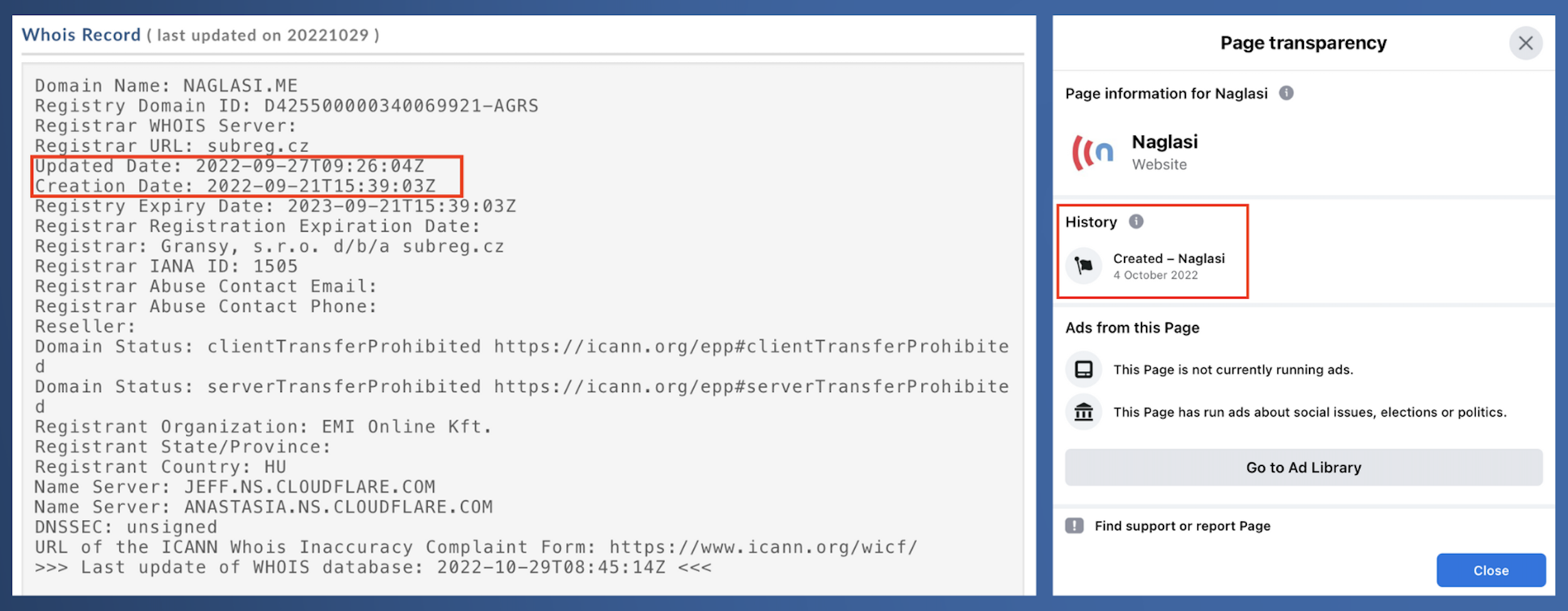
The Naglasi page was created on October 4, 2022, while the domain was leased on September 21. In seven days (October 15 – 23), it spent over 15,000 EUR on political advertising – exclusively for one party – the Civic Movement URA, its candidate for mayor, Luka Rakčević, and their views. Thus, the position of the European Commissioner for Enlargement Várhelyi, independently and differently from the European Commission, interpreted specific segments of the report of that Institution on the progress of Montenegro, welcomed by the current Prime Minister Abazović was sponsored as well.
It is indicative that after the election on October 23, there were only two announcements on that platform, in contrast to the pre-election period when they were significantly more active.
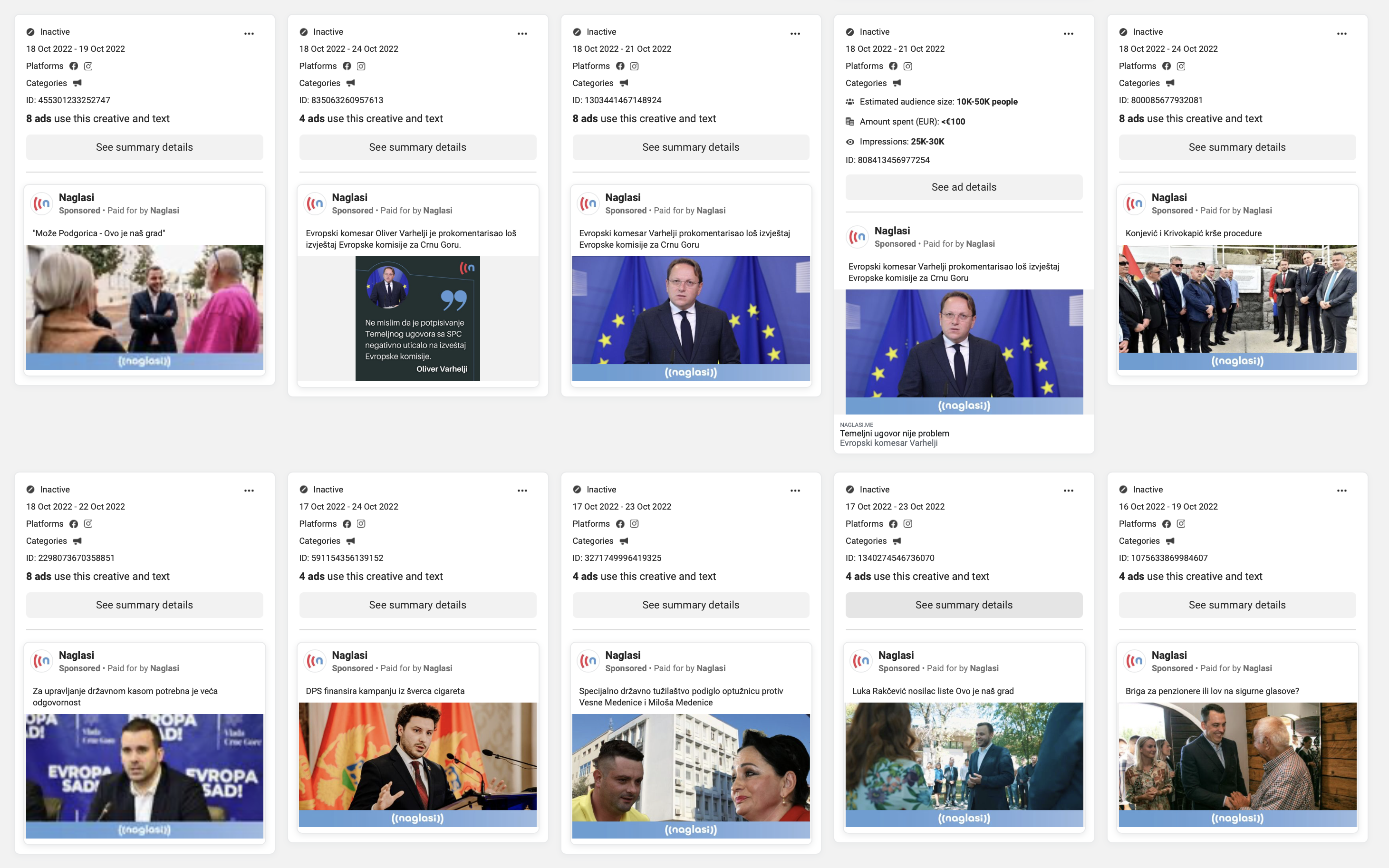
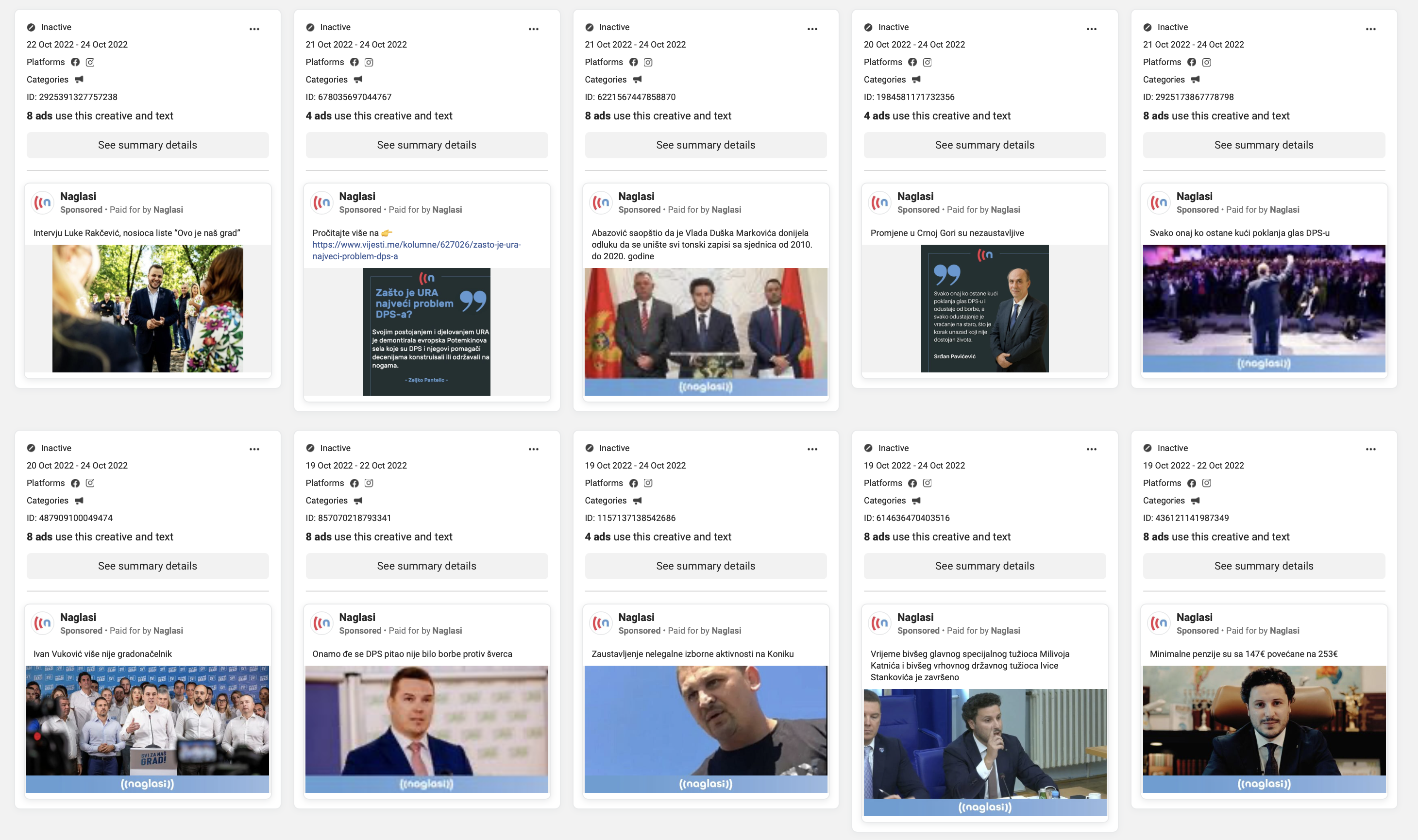
On their website, they point out: Naglasi is a platform where we collect what we believe to be the most important content on the Internet (fact-finding articles, news, reports, opinions, vlogs, podcasts, etc.) and, with your support, deliver it to as many people as possible through social media and digital advertising.
After a series of abuses of the platform by third parties, in 2020, Facebook increased the transparency of political campaigns to its network and introduced a set of new political advertising rules, according to which all authors of political ads must identify themselves and leave some personal information.
In this way, the DFC managed to get the Montenegrin phone number of a person who was left as an identification mechanism – the Hungarian Tamas Bodi. It should be noted that DFC discovered a Hungarian site, Erosito, with an identical design, logo, and work model.
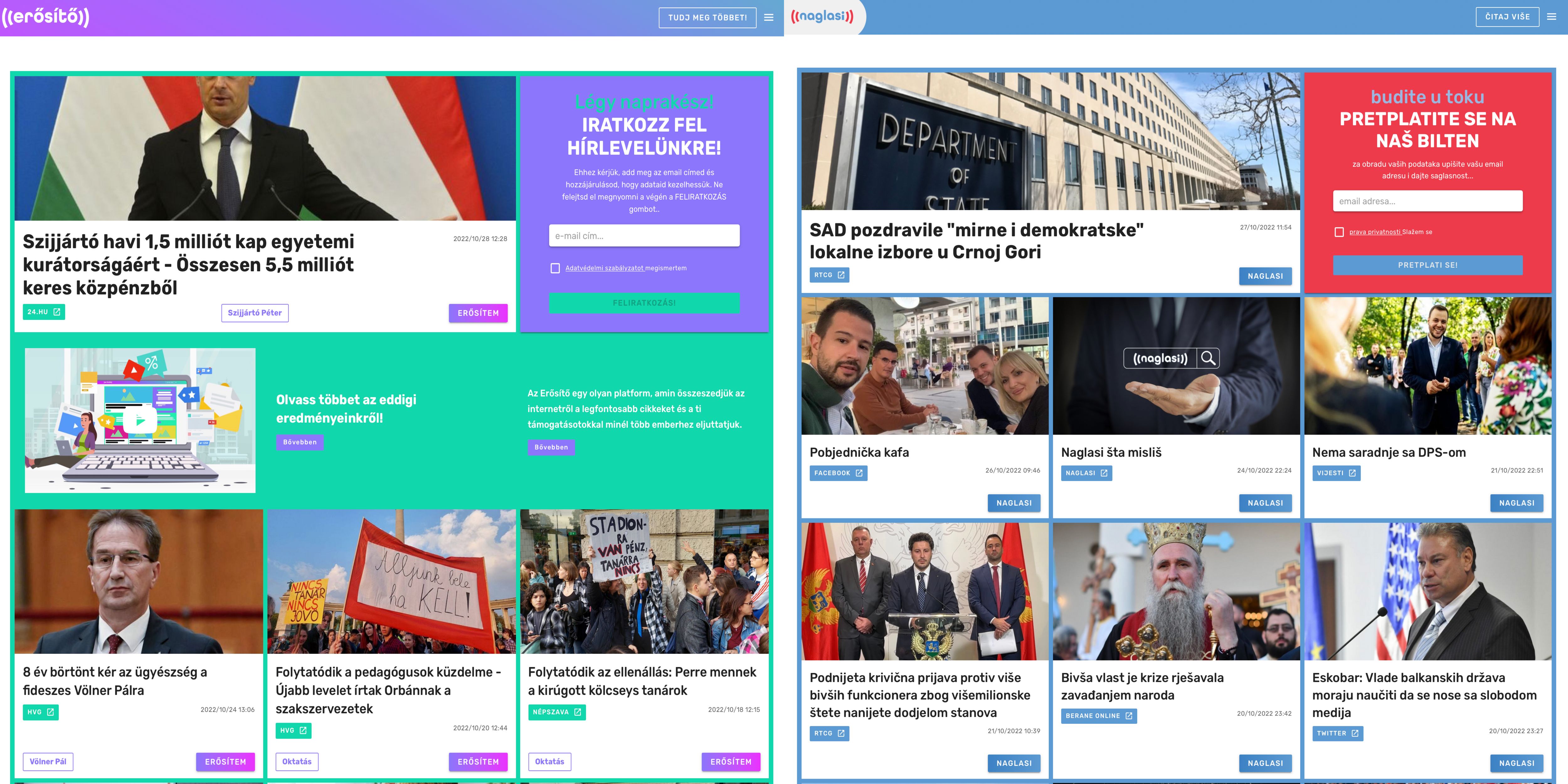
Since the page spent twice as much money as any political party, the DFC has sent an inquiry with the aim of obtaining more information about the way of financing the political campaign and advertisements from that page and possible connections with GP URA, since 15,000 EUR was spent on the promotion of that party and her candidate.
Also, as through open-source investigation, we were unable to find more information about the Hungarian citizen whose phone number is used to place political advertisements on the most popular social network in Crna Gora, we sent a set of questions to the Ministry of the Interior, intending to determine Bodi’s periods of stay and whether it overlaps with any previous elections in our country.
We asked GP URA to provide us with data on which pages on Facebook they placed political advertisements for the campaign for local elections, as well as how much money was spent on it.
We have not received answers to any of the emails sent, despite, in the first case, the principle of openness of the Naglasi page that they emphasize on their website, and in the second case, referring to the Law on Free Access to Information in an email sent to the Department for the Protection of Personal Data and Free Access to Information of the Ministry of Interior. Also, there was no response from GP URA.
Despite Facebook’s measures aimed at protecting democratic processes, which prevent the placement of political advertisements outside the borders of the advertiser’s home country, the example of the Naglasi page shows that there are loopholes in the law, which are used to directly interfere with foreign factors in the election processes in Montenegro.
Other parties and clicks
When it comes specifically to the official pages of the parties on Facebook, the Civic Movement URA spent 3,834 euros for promotion. In comparison, 4,106 euros were used for sponsoring posts via the official page of candidate Luka Rakčević. The money spent by Naglasi, the Civic Movement URA, and Luka Rakčević (22,991 EUR) enabled political messages favorable to the current prime minister’s party to be viewed about 11 million times.
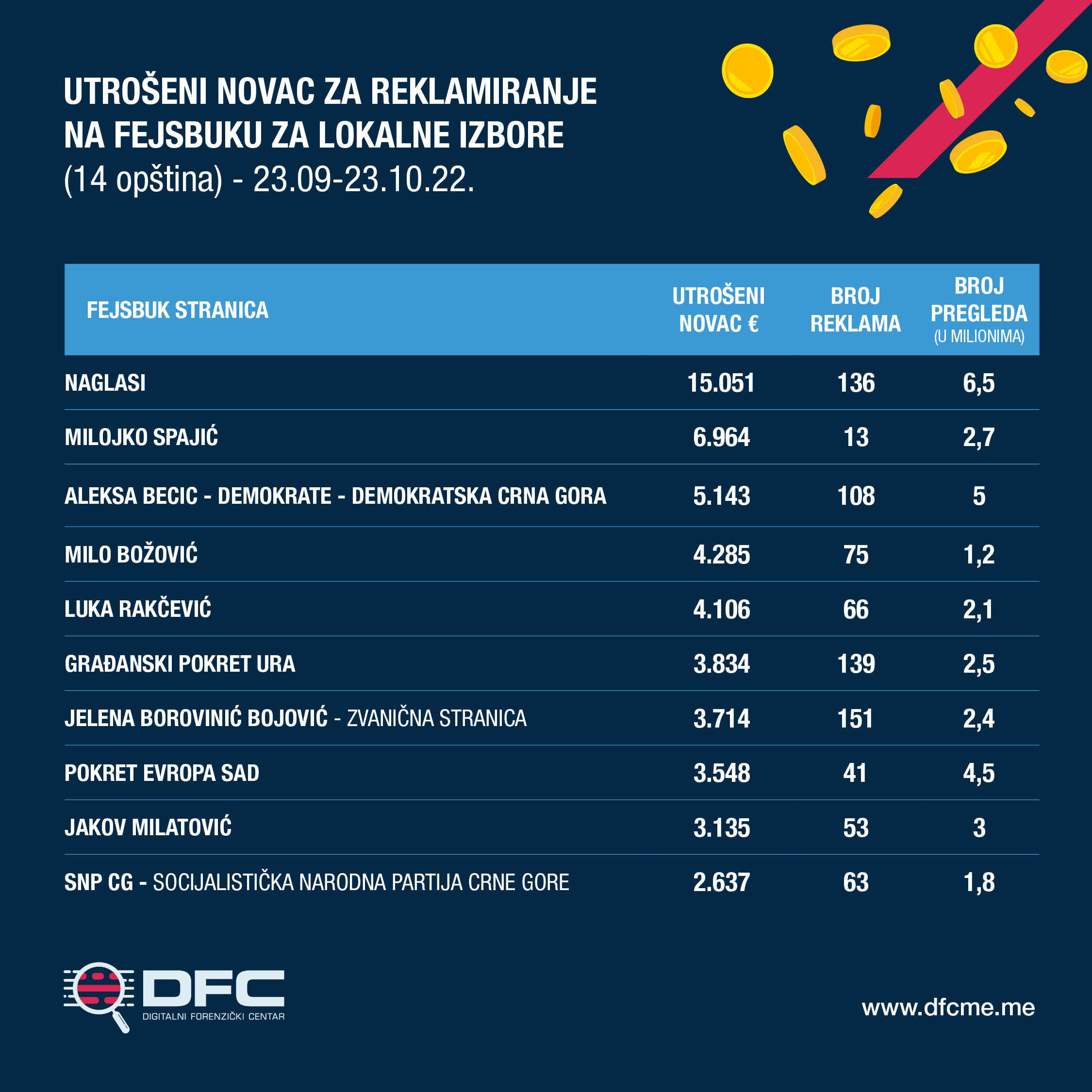
During the month-long pre-election campaign, the Evropa Sad movement, which achieved significant results in the local elections in Podgorica, paid slightly more than 3,500 euros for political Facebook promotion. When you add to those individual advertisements on the pages of the leaders of that Movement, Jakov Milatović and Milojko Spajić, they spent 13,647 euros. For that money, Facebook made it possible for the political messages of the Movement Europe to be viewed about 10 million times on this platform. In the local elections in Podgorica, where around 350,000 voters had the right to vote, the Europe movement won as many as 13 mandates, making them the main constituents for forming the government in the capital city. The results show that every fifth citizen of Podgorica voted for the newly founded movement led by former ministers Jakov Milatović and Milojko Spajić. They recorded similar success in other cities, which makes them one of the biggest winners in this series of elections. The promoted content, which exclusively focused on economic and social issues, contributed to this result. In addition to paid advertisements, the interaction with Facebook users was also enhanced by fake profiles that shared political messages and the contents of the Europe Now Movement. DFC noted the operation of a certain number of fake profiles whose sole aim was to support and promote a particular political group, the Europe Now Movement. These are the same fake Facebook profiles that continuously enabled and supported the 42nd Government of Zdravko Krivokapić, abusing photos of real people.
In third place in terms of the most considerable amount of money spent in the pre-election campaign is the page of Aleksa Becic – Democrats – Democratic Montenegro, with 5,143 euros for 108 advertisements viewed 5 million times.
The official Facebook page of Jelena Borovinić Bojović, a candidate for the local elections in Podgorica in front of the list For the Future of Podgorica, spent 3,714 euros for 151 advertisements. On the other hand, the official page of Milo Božović, a candidate for the local elections in Budva in front of the Za budućnost Budve list, spent 4,285 euros for 75 advertisements. Bearing in mind that Borovinić Bojović and Božović were representatives of the Democratic Front during the election campaign, the messages of this political constituent were viewed more than 3.5 million times.
The official page of the Svi za nas grad list, led by former mayor Ivan Vuković for political advertising a month before the elections, spent 2,058 euros.

